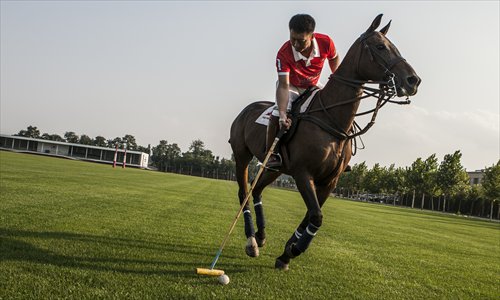

Liu Shilai, an avid amateur Chinese polo player and the founder of the Tang Polo Club in Tongzhou district. Photo: Li Hao/GT
On a bright afternoon in a vast, primly trimmed lawn hidden behind the gated walls of the Tang Polo Club in Beijing's Tongzhou district, a handful of men, gallantly attired in ankle-high boots and carrying long cane mallets, chase a small plastic ball on horseback. It is the last week of September, and cheered on by family and friends, the men are fighting for the bragging rights of being named the champions of the 2014 China Open Polo Tournament.
"I see polo as a battlefield without smoking guns, waged between social elites from different countries," said Liu Shilai, a member of the winning Royal Salute China Team that vanquished all comers to take the tournament title this year.
Once a popular Tang Dynasty (618-907) pastime that made its way to China from Persia via the silk road, polo has in recent centuries come to be associated with the aristocratic leisure classes in the West. For many, it represents the kind of social privilege that is today ridiculed - a relic of a bygone era when wars were waged on horseback, and a distasteful reminder of an era when wealth and power was controlled by a small number of ruling families while the majority lived in destitution.
During the Cultural Revolution (1966-76), polo ceased to be played in China. However, as the country's fortunes have changed in recent decades, there is again a growing interest in the sport among China's wealthy.
The sport made its official return to these shores with the Royal Salute Polo Championship held at the Zhejiang Nine Dragon Hill Polo Club in 2007. At present, there are four polo clubs in Beijing and Tianjin, each of which host a number of invitational polo events each year.
"In China, most people who play polo are private entrepreneurs aged between 40 and 50," said Liu, who in addition to being an avid polo player, also serves as the chairman of the Jinghong Investment Company and is the founder of the Tang Polo Club where this year's China Open was hosted.
Although it is estimated that there are less than 100 polo players in the country, this is in part by design. The Tang Polo Club's website, which describes itself as "provid[ing] a first-class country club atmosphere to social elites," keeps membership numbers to just 40 people "in order to maintain the club's exclusivity."
It was reported by the Guangzhou Daily that annual membership to a polo club in China can cost at least 380,000 yuan ($61,925) per year.
The sport of kings
Polo has traditionally been known as the "sport of kings."
Unlike most professional sports these days which are financially backed by a corporate funding structure, polo teams are supported through a patron system. The patron uses his personal wealth to pay for the costs of running a team, from the wages of professional players, veterinarians and groundsmen to travel and accommodation expenses. The team's patron, usually an amateur polo player, will often play alongside the professionals as a member of the team.
The term "patron" and the economic structure it describes harkens back to the sports' aristocratic history, in which those who possessed specialized skills in the sciences, music or art were entirely reliant on a wealthy landowner for their livelihoods.
Also reproducing the dynamics of aristocratic privilege is the opportunity afforded by polo patrons to hobnob with social elites around the world.
Liu has played polo with Prince William and Prince Harry; and Xu Peifeng, a Shanghai-based businessman who is one of the four or five other polo patrons in China, has brushed shoulders with Thailand's royal family.
Copyright ©1999-2018
Chinanews.com. All rights reserved.
Reproduction in whole or in part without permission is prohibited.